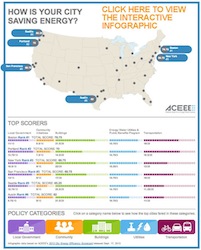Boston, Massachusetts took top honors for its energy saving efforts according to the 2013 City Energy Efficiency Scorecard, a report released by the American Council for an Energy Efficient Economy (ACEEE). In addition to city rankings, the report also includes strategies and recommendations for all cities to lower energy use.
“We couldn’t be more proud of our progress in creating a greener, healthier city,” said Boston Mayor Thomas M. Menino. “Boston is a world-class city, and we know that our economic prosperity is tied to its ‘greenovation,’ which has helped create jobs and  improve our bottom line. Reducing our energy use is just one smart step in improving the quality of life in Boston and around the world.”
improve our bottom line. Reducing our energy use is just one smart step in improving the quality of life in Boston and around the world.”
In addition to Boston in the top spot, other top-scoring cities include Portland, Oregon; New York City, New York; San Francisco, California; Seattle, Washington; and Austin, Texas. The next tier of top-scoring cities (Washington, D.C., Minneapolis, Chicago, Philadelphia and Denver) have also developed efficiency initiatives and are poised to rise in the rankings in future years.
“Our report shows that cities are laboratories of innovation for energy-saving solutions that directly benefit people where they live, work and play,” said Eric Mackres, ACEEE’s local policy manager and the report’s lead author. “Local governments have great influence over energy use in their communities and many have initiatives that result in significant energy and cost savings.”
ACEEE said the report is the first to rank cities exclusively on energy efficiency efforts. Cities are evaluated on what actions they’re taking to reduce energy use in five key areas: buildings; transportation; energy and water utility efforts; local government operations; and community-wide initiatives.
Key findings include:
- Local leadership and commitment to energy efficiency is strong.
- Boston achieved the highest score overall, but other cities led in some policy areas. Portland scored highest in transportation and local government operations. Seattle ranked first in building policies. San Francisco tied with Boston for first in utility public benefits programs, and Austin is the city furthest ahead of its state on energy efficiency policy.
- All cities, even the highest scorers, have significant room for improvement. Boston, the highest scoring city, missed nearly a quarter of possible points.
Key recommendations for cities includes: lead by example by improving efficiency in local government operations and facilities; adopt energy savings goals; actively manage energy use, track and communicate progress toward goals, and enable access to data on energy usage; adopt policies to improve efficiency in new and existing buildings; partner with energy and water utilities to promote and expand energy efficiency programs; and adopt policies and programs to lower transportation energy use through location-efficient development and improved access to additional travel mode choices.
Steven Nadel, ACEEE’s executive director, concluded, “The good news is that cities across the country are saving money, creating local jobs, and protecting the environment by implementing energy efficiency measures.”

